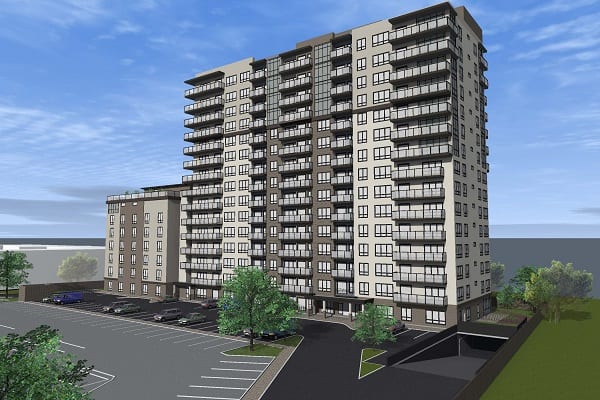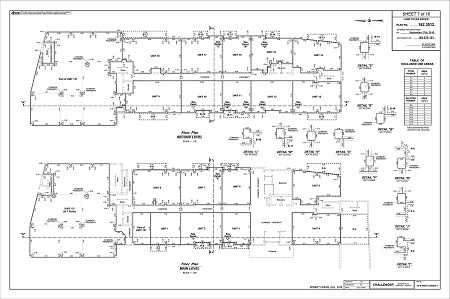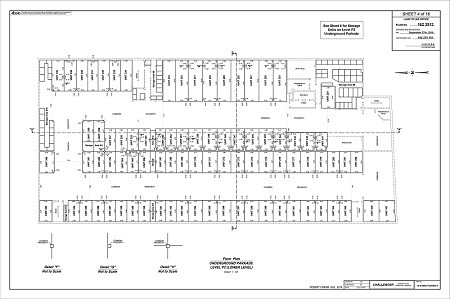Specializing in Building Condominium Surveys
Let’s assume that you own a piece of land and are looking to maximize the return on your investment by developing that property. Creating a condominium (condo) might seem like the way to go.
Not all land surveyors have the experience to help with a condo project. There are many complexities to condominiums and stratas that are not considerations when constructing a building for a sole owner. However, a surveyor who specializes in condo surveys knows potential pitfalls and can offer strategic advice as it pertains to the development requirements, government legislation, and updated Condominium Property Act and Regulations.
Challenger Geomatics conducts surveys for dozens of condo developments every year, working on projects through all phases from the initial site survey all the way to final as-built and real property report surveys. Even on smaller developments, mistakes can cost you both in construction delays and legal fees, which is why hiring specialized and experienced survey staff is crucial to the success of new condo developments.

Shepherd’s Gardens – Heritage (near Century Park, Edmonton, Alberta)
In legal terms, it’s important to remember that a condo is not the building itself but a way of dividing ownership, and this isn’t limited to your typical high-rise residential condominium development. It can just as easily be applied to:
- bare land condos (similar to conventional subdivisions)
- commercial or industrial buildings
- conversions (of existing buildings such as apartments formerly for rent)
- townhomes or other types of multi-unit dwellings (duplex, triplex, fourplex, etc.)
If you want to create a condo, you first need to take a look at market demands for different types of housing stock. The development cycles are long, particularly for a high-rise buildings, and a developer has to carefully manage the project timelines and understand all the risks. An experienced condo surveyor not only ensures that all planning boxes are checked and are done in the right order, but also can offer strategic insights into the development process, and what your project needs to ultimately be successful.
Legal Surveys for Condominium Plans
The submission of a condominium plan requires detailed planning and the careful preparation of supporting documents before your proposed condo is even reviewed by the local planning department. This means close cooperation with owners, the municipality, lawyers, engineers, and architects to collect the necessary information as well as prepare legal condominium plans for registration at the Land Titles Office.
The Plan must show the exact location of any proposed building in relation to the property boundaries as well as in relation to the location of utilities, easements, and other natural or man-made features.
Each unit must also be carefully defined. Units must be numbered, unit factors must be determined, and sufficient floor plans and cross-sections must be shown to illustrate the unit. Similarly, common property and parking must be clearly distinguished.

Main Floor

Parking Level

Roof
In recent years, many condo developers have used pre-sales to raise funds for construction. This has proven to be a very effective financing model. To pre-sell a development involves entering into an agreement with the buyer, and in order to fulfill their legal obligations, the developer must clearly define the condo they intend to deliver. This is achieved with ‘preliminary’ condo plans prepared by a certified professional land surveyor, such as an Alberta Land Surveyor (ALS) within the province of Alberta, or for other locations within Canada one registered under the comparable provincial or federal licensing association as applicable.
Construction Survey
Once you receive building and development permits, you’re ready to begin construction on your new condo development.
The kinds of surveying work that will be needed during the construction phase of the project will vary, but you can expect foundation and pile layout plus a real property report at the foundation stage will be required to ensure the project is built according to plan. Using a competent and professional surveyor is critical here, as errors at this stage of a project can be costly to fix and cause delays to the project.
Locations for anchor bolts, building grid lines, grades, and elevations should all be determined by a land surveyor. Similarly, any underground infrastructure should be located to avoid being damaged during construction, which in addition to posing a safety risk can result in significant cost overruns and project schedule delays.
Various kinds of control surveys and monitoring may also be required to track progress and ensure surrounding buildings and the environment are not negatively impacted by construction. For example, shoring walls on sites with challenging topography may need to be monitored for deformation in order to ensure a safe construction site is maintained.
Completion
Finally, before occupancy all buyers need to be registered with appropriate documentation at the Land Titles Office. As with the initial condo development, Challenger provides condo developers with survey support services related to Land Titles, including final condo plans and related documentation.

